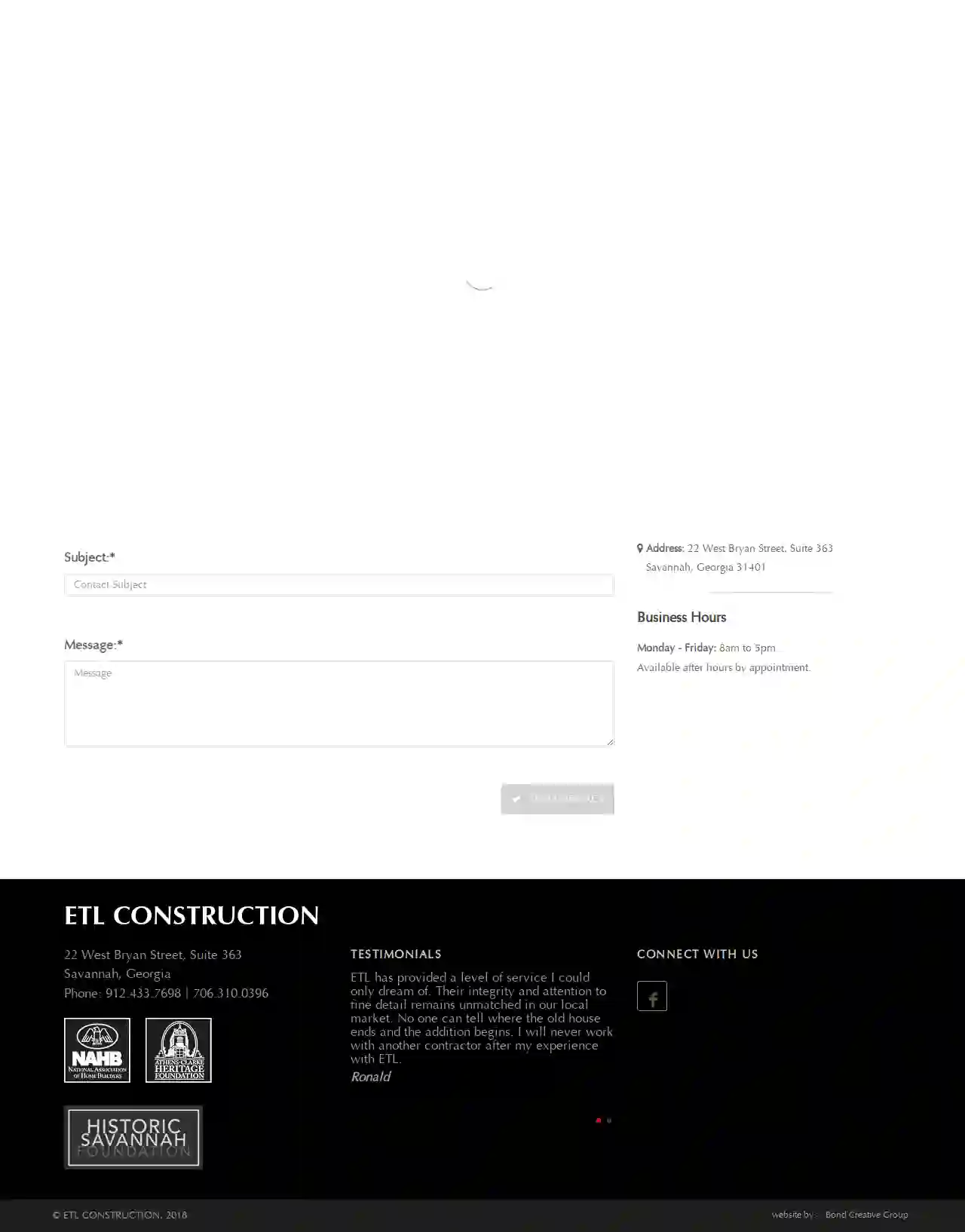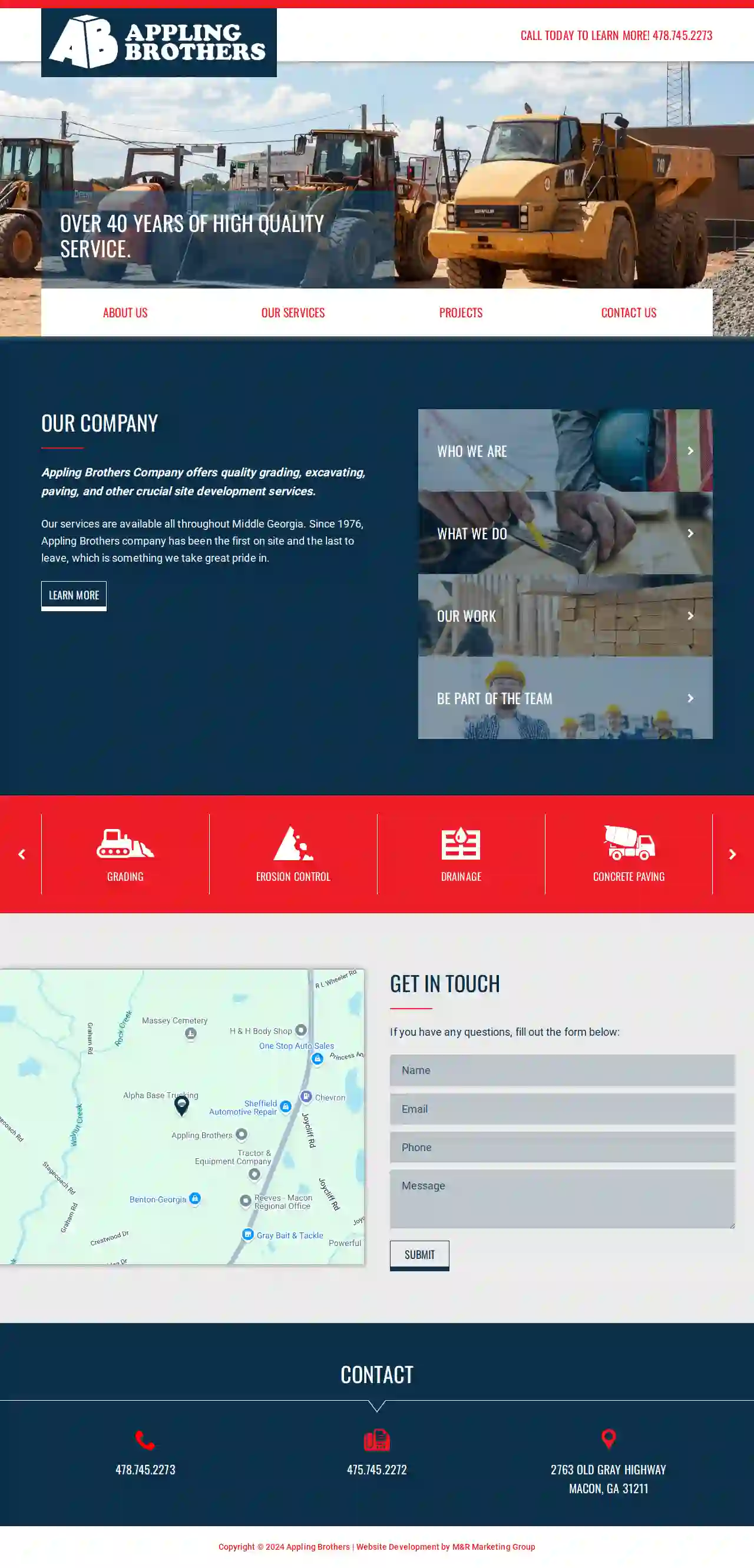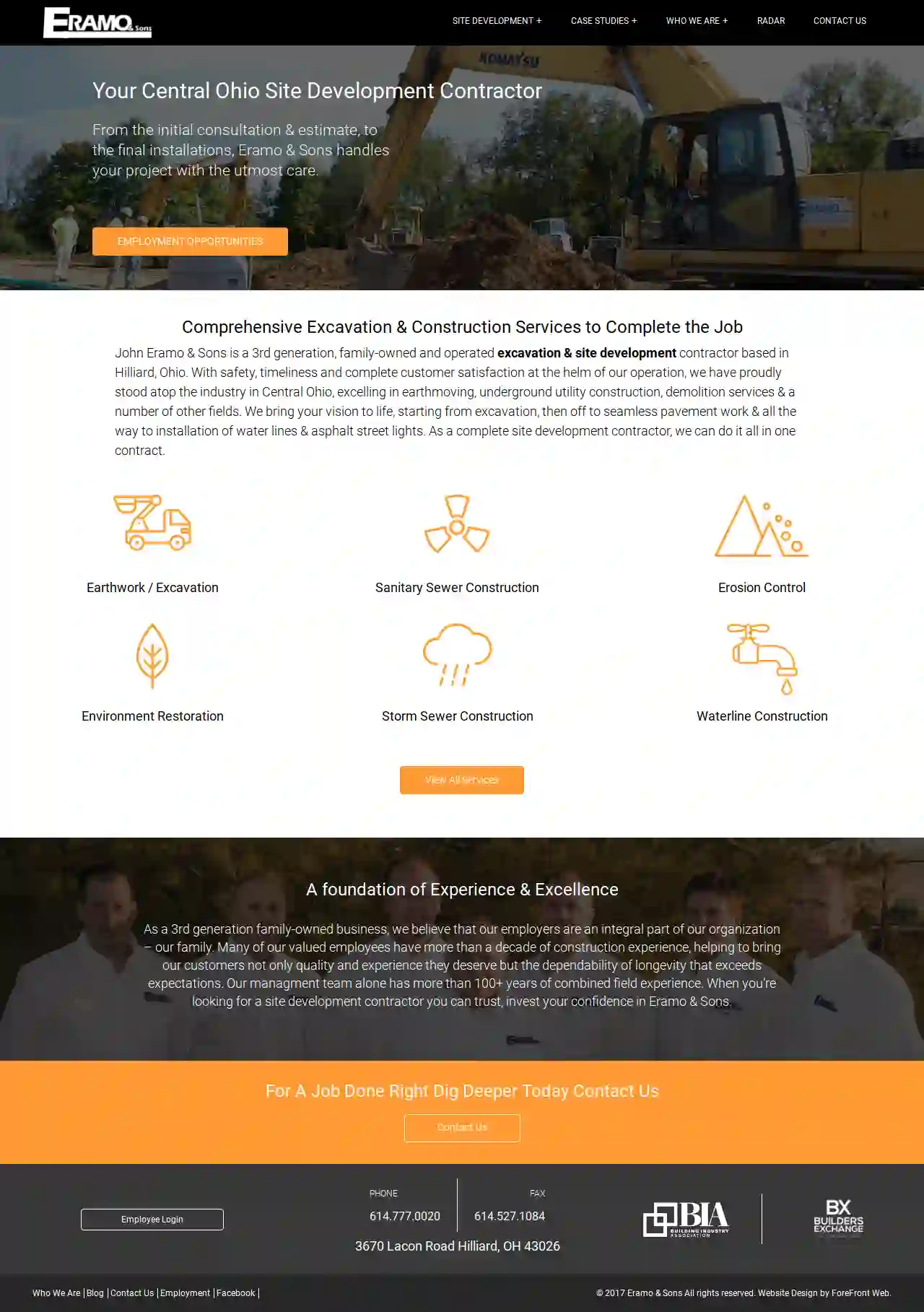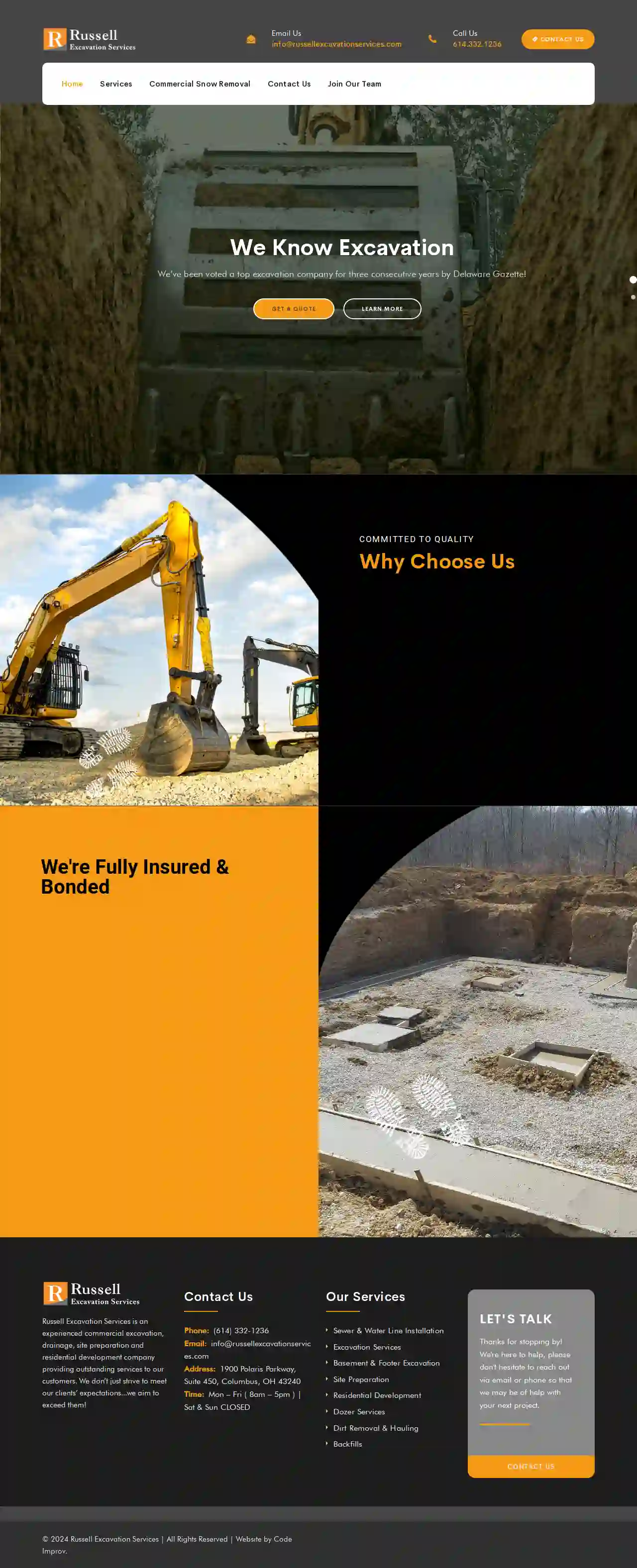Demolition Contractors Holly Springs
Find Demolition Contractor in Holly Springs
Receive up to 3 Demolition Company Near Me quotes for your project today! Compare profiles, reviews, accreditations, portfolio, etc... and choose the best service.

ETL Construction
22 West Bryan Street, Suite 363, Savannah, 31401, USETL Construction: Building Your Dreams, Preserving History ETL Construction is a trusted name in Savannah for historic preservation and construction services. We are passionate about transforming visions into reality, blending modern techniques with the preservation of historical integrity. Our team of skilled professionals is dedicated to exceeding expectations, delivering exceptional craftsmanship and personalized attention to every project. Whether you're embarking on a residential renovation, a commercial project, or a historic preservation endeavor, ETL Construction is your reliable partner. We take pride in our commitment to quality, meticulous attention to detail, and open communication throughout the entire process. Explore our website to discover our services, view our impressive portfolio, and learn more about our team. Contact us today to discuss your project and let us help you build your dreams into reality.
- Services
- Why Us?
- Testimonials
- Gallery
Get Quote
Coastal Grading & Rental Inc
46 reviews1245 Sand Hill Rd, Guyton, GA, 31312, USTo Our Customer's Coastal Grading is committed to providing the highest quality, value-added site preparation services to our coastal Georgia and South Carolina customers. We believe that by creating a successful partnership with our customers throughout the project process, we can exceed their expectations and gain their trust. We pledge to do this through the exceptional performance of every member of the Coastal Grading team. The Short Version Of Our Story Founded in 1981 by Gerald Odom, Coastal Grading began with a modest start. After 10+ years working as a foreman with local asphalt paving companies, Gerald start Coastal Grading and Rental with a pickup truck, a backhoe and a trailer. Gerald’s hard work and integrity paid off quickly growing the company to one of the most highly respected site-work contractors in the Low Country. It became a common theme in the Savannah Market that “no one could out work Gerald Odom”. His dedication set the bar for everyone that joined the Coastal Grading Team. Coastal Grading has provided a wide variety of site-work services throughout the Low Country over the past 40+ year; everything from truck yard maintenance to large warehouse construction. Colonial Terminals yard maintenance, SCAD Ronald C. Waranch Equestrian Center, Ellis Square and Underground Parking Garage, SCAD’s Sands at One West Victory, Benedictine Military School Parade Ground, are only a few of the successful projects of Coastal Grading’s long esteemed history. Gerald’s most successful achievement was building the best commercial grading team in the Savannah Market. After over 50 years in the commercial construction business, Gerald Odom turned over the reigns to Brian Hussey. A well-known, well-respected local businessman, whose father was Roy Hussey, founder of Hussey-Gay-Bell Engineering firm. Brian came “full circle” from holding a survey rod during summer jobs with Hussey-Gay-Bell to owning a civil construction company. It is well known in the commercial construction arena in the Low Country, if you want it done right, hire Coastal Grading. Get To Know Our Team After 40 years of successful leadership in the Site Preparation Industry, Gerald Odum has “passed the torch” to Brian and CG Partnership LLC. Brian brings a unique combination of talents and experiences to his role as the new leader of Coastal Grading including organizational and financial expertise, a strong work ethic, and a commitment to customer satisfaction. Brian is a proven leader with a passion for the construction industry and a deep understanding of the needs of our customers.
- Services
- Why Us?
- Our Team
- Testimonials
- Gallery
Get Quote
GS Excavation & Hydroseeding
57 reviewsColumbus, USWelcome to GS Excavation and Hydroseeding Welcome to GS Excavation and Hydroseeding. Our main goal is to always achieve a high level of customer satisfaction with the services and products that we provide. We offer both Commercial and Residential Excavation, and HydroSeeding. No project is too big or too small for us. We also offer Commercial Snow and Ice removal. Please browse our site to discover what we’re all about. Call us Email us
- Services
- Why Us?
- Gallery
Get Quote
Appling Brothers
4.38 reviews2763 Old Gray Highway, Macon, 31211, USGiving Clients the Best Finished Product in the Industry For over 40 years, Appling Brothers Company has faithfully served Middle Georgia with top-notch site development, grading, excavating, and many other construction site services. Founded in 1976 by the Appling Brothers, the company was eventually purchased by Al Bridges. Appling Brothers is now operated by his son, Darrell Bridges. Appling Brothers is a family-oriented company, and we take great pride in our reoccurring clients and business. We serve a multitude of industries including education (K-12 and higher education), residential, medical, commercial, municipal, and many more. Unparalleled Professionalism & Customer Service At Appling Brothers, we believe that our professionalism is second to none. From the moment we begin a project until we leave the construction site for the final time, our goal is to provide the customer with unparalleled professionalism and customer service by our thoughtful and hard-working staff. Our team is made up of experienced, skilled tradesmen who are dedicated to delivering high-quality work for each project we take on. The materials used by Appling Brothers are the safest, most environmentally friendly in the industry. Our materials comply with the U.S. Department of Transportation and exceed minimum state and federal regulations. By combining high-quality materials with high-quality work, we give our clients the best finished product in the industry. Our Work Appling Brothers Company has been responsible for the completion of hundreds of successful projects around Middle Georgia. We take the time before every project to meet with the client and put together a plan that will ensure all goals are met, if not exceeded. Appling Brothers will work around the clients’ schedule, business operations, and any other issue or situation specific to the client. Large projects in Middle Georgia that we’ve completed: Cirrus Academy The Shoppes at River Crossing Bass Pro Shops, Macon Mercer University Football, Baseball, Residence Hall Lofts at Mercer Lofts at Bass Lofts at College Veterans Elementary Colquitt County High School Washington County High School Jasper County High School Various Five Star Automotive Projects in Macon and Warner Robins Houston Medical Little Richard Penniman Blvd. Navicent Health Cancer Center The Roundabout at Mercer Our Leadership Darrell Bridges – President Hugh Hamrick – Estimator David Thaxton – Human Resources/Safety Director Berry Batchelor – Shop Maintenance Supervisor Tisha Amerson – Office/Project Administrator Pamela Billingsley – Office Accountant
- Services
- Why Us?
- Our Team
- Gallery
Get Quote
Ground Control Landworks
54 reviewsGround Control Landworks, Covington, 30014, USGround Control Landworks: Your Trusted Land Management Experts Ground Control Landworks is a leading land management company in Covington, Georgia, specializing in a wide range of services designed to transform your land into the vision you have in mind. For over a decade, we've been providing clients with quality excavating services, earning a reputation for reliability, professionalism, and customer satisfaction. We understand that land management projects can be complex, and we're committed to handling every challenge with honesty and expertise. Whether you need land clearing, brush clearing, stump removal, site preparation, or excavating services, our team is equipped to handle it all. We're your one-stop shop for all your land management needs, ensuring your project is completed efficiently and to the highest standards. At Ground Control Landworks, we prioritize your satisfaction. We're dedicated to providing clear communication, competitive pricing, and a commitment to exceeding your expectations. Contact us today to discuss your project and let us help you achieve your land management goals.
- Services
- Why Us?
- Gallery
Get Quote
Ace Grading
4.216 reviewsRural Route 1, Box 3470-C, Ava, 65608, USAt Ace Grading, Land Clearing and Utility Installations, LLC, we pride ourselves on being a reliable and trustworthy partner for all your land clearing and utility installation needs. With over 40 years of experience in the construction industry, our team is dedicated to providing top-notch services that meet the highest standards of quality and customer satisfaction. Our services include brush and land clearing, foundation digs and concrete slabs, driveway grading and gravel, fence row, hunting trail and range, general site improvements, outdoor horse arenas, pasture reclamation, pond excavation, road clearing, mobile home site work, new septic systems, new storm shelters, tree and stump removal, and utility trenches for electric, water, and sewer. We serve customers in Christian, Douglas, Greene, Ozark, Polk, Taney, Webster, and Wright counties, and our team is committed to providing personalized attention to each project, ensuring that every customer receives the best possible service. At Ace Grading, Land Clearing and Utility Installations, LLC, we understand the importance of reliability, quality, and customer satisfaction. That's why we offer free estimates in writing, are licensed and insured, and have an A+ rating with the Better Business Bureau.
- Services
- Why Us?
- Accreditations
- Our Team
- Gallery
Get Quote
United Grading & Excavating
319 reviews199-A Fairburn Ind Blvd, Fairburn, 30213, USAbout United Grading & Excavating United Grading & Excavating is a full-service Site Development Contractor, specializing in clearing, grading, and utility work. We have a SAFETY EMR RATE OF 0.71. Our company performs commercial, industrial, multi-family residential, municipal, and governmental site development throughout the Southeast. United Grading and Excavating is committed to providing expert service at a competitive price while completing projects in a timely manner. Our growth is reflected in an ever-expanding list of satisfied customers that appreciate consistency in work, attention to detail, and commitment to a job well done. United Grading & Excavating can perform either as a general contractor working directly for the owner of a project, or as a subcontractor to another general contractor or construction manager. With multiple crews and an extensive fleet of equipment, we can meet the overall schedule of any project. Our management team, with more than 60 years of site work experience, along with our highly motivated and accomplished field personnel, ensures that we will meet our goal to exceed the customers’ expectations by delivering a quality site, safely, on time, and within budget. 1995 Year Established 400+ Projects Completed 250+ Dedicated Employees 1 Path to Success
- Services
- Why Us?
- Gallery
Get Quote
John Eramo & Sons, Inc.
4.26 reviews3670 Lacon Road, Hilliard, 43026, USYour Central Ohio Site Development Contractor From the initial consultation & estimate, to the final installations, Eramo & Sons handles your project with the utmost care. Comprehensive Excavation & Construction Services to Complete the Job John Eramo & Sons is a 3rd generation, family-owned and operated excavation & site development contractor based in Hilliard, Ohio. With safety, timeliness and complete customer satisfaction at the helm of our operation, we have proudly stood atop the industry in Central Ohio, excelling in earthmoving, underground utility construction, demolition services & a number of other fields. We bring your vision to life, starting from excavation, then off to seamless pavement work & all the way to installation of water lines & asphalt street lights. As a complete site development contractor, we can do it all in one contract. A foundation of Experience & Excellence As a 3rd generation family-owned business, we believe that our employers are an integral part of our organization – our family. Many of our valued employees have more than a decade of construction experience, helping to bring our customers not only quality and experience they deserve but the dependability of longevity that exceeds expectations. Our managment team alone has more than 100+ years of combined field experience. When you’re looking for a site development contractor you can trust, invest your confidence in Eramo & Sons.
- Services
- Why Us?
- Gallery
Get Quote
Russell Excavation Services
4.633 reviews1900 Polaris Parkway, Suite 450, Columbus, 43240, USAbout Russell Excavation Services Russell Excavation Services is a family-owned business that was born from prayer and founded on the principles of providing quality work, a high level of customer service, and demonstrating strong integrity in all we do. With owner Russ having grown up in the excavation industry, he has a deep passion for the work we do, and it shows in the attitudes and skillset of our crews who he personally trains. As one of the region's most trusted and dependable companies, you can count on us to go the extra mile with a commitment to completing your project smoothly and on time. We appreciate your interest in our company. We welcome the opportunity to speak with you, answer any questions you may have, and to set up a time to meet with you personally to discuss how we can help you with your project.
- Services
- Why Us?
- Gallery
Get Quote
North Georgia Clearing and Excavation LLC
53 reviewsAtlanta, USWelcome to North Georgia Clearing and Excavation LLC Unlock the full potential of your property with our comprehensive land clearing and excavation services. North Georgia Clearing and Excavation LLC is a small, family owned and operated firm specializing in top-notch solutions for land owners, property owners, farms, stables, and commercial properties. Whether you're envisioning a pristine lot for development, need to rejuvenate your land, or need routine maintenance, we've got you covered! Get to know us. Welcome to North Georgia Clearing and Excavation LLC – where precision meets passion, and expertise transforms landscapes. I am TJ, the proud founder and owner of this dynamic venture, and it is my pleasure to share my story with you. As a native of the picturesque North West Georgia region, my connection to the land runs deep. Growing up surrounded by the stunning natural beauty of our area, I developed a profound appreciation for the balance between progress and preservation. This appreciation sparked a lifelong commitment to responsible land development, paving the way for the creation of North Georgia Clearing and Excavation LLC. My journey in the excavation and clearing industry began with a genuine desire to make a positive impact on our local community. Armed with a strong work ethic and a vision for excellence, I set out to establish a company that would not only meet the needs of our clients but also uphold the values that define our beloved North Georgia. We are a small, family owned and operated business. Everyone on our our team has a vested interest in our company. What sets us apart is our unwavering dedication to client satisfaction. We understand that your project is more than just dirt and rocks – it's a vision, a dream, a future. Our goal is to bring that vision to life with meticulous attention to detail and a client-centric approach that ensures your needs are not just met, but exceeded. Beyond our expertise in excavation and land clearing, we are proud to be a community-driven company. Giving back to the region that has given us so much is a core value at North Georgia Clearing and Excavation LLC. Whether it's supporting local initiatives or participating in environmental conservation efforts, we believe in investing in the long-term health and prosperity of our community. Thank you for considering North Georgia Clearing and Excavation LLC for your project. I look forward to the opportunity to work with you and demonstrate the passion, precision, and professionalism that define our company. Together, let's embark on a journey of transformation, where your vision meets the expertise of North Georgia Clearing and Excavation LLC.
- Services
- Why Us?
- Our Team
- Testimonials
- Gallery
Get Quote
Over 22,076+ Excavation Contractors onboarded
Our excavation contractors operate in Holly Springs and beyond!
ExcavationHQ has curated and vetted Top Excavation Businesses arround Holly Springs. Find a reliable business today.
Frequently Asked Questions About Demolition Contractors
- Clear the Site: Remove all furniture, appliances, personal belongings, and any valuable items from the structure.
- Secure the Perimeter: Fence off the demolition area to prevent unauthorized access and protect surrounding property.
- Disconnect Utilities: Arrange for the disconnection of electricity, gas, water, and other utilities servicing the building.
- Hazardous Material Abatement: If asbestos, lead paint, or other hazardous materials are present, have them professionally removed before demolition begins.
- Notify Neighbors: Inform your neighbors about the demolition schedule to minimize disruptions and address any concerns.
- Obtain Permits: Ensure all necessary demolition permits are in place before starting work.
- Project Assessment: The demolition contractor evaluates the structure, site conditions, and project requirements.
- Permitting: Obtain necessary demolition permits from local authorities.
- Site Preparation: Secure the site, disconnect utilities, and remove any valuable or reusable items.
- Hazardous Material Abatement: Professionally remove asbestos, lead paint, or other hazardous materials if present.
- Demolition: Execute the chosen demolition method, bringing down the structure safely and efficiently.
- Debris Removal and Site Cleanup: Sort, process, and dispose of demolition debris responsibly. Clean up the site to prepare it for future use.
- 'Can I see proof of your licensing and insurance?' Verify their credentials and coverage.
- 'What experience do you have with projects like mine?' Ensure they have relevant expertise.
- 'Can you provide references from past clients?' Check their reputation and customer satisfaction.
- 'What are your safety protocols?' Prioritize contractors who emphasize safety.
- 'How will you handle hazardous materials?' Ensure they have proper procedures for asbestos or lead abatement.
- 'What is your timeline for completing the project?' Understand the project duration.
- 'How will you manage noise, dust, and debris?' Discuss mitigation measures for minimizing disruption.
- 'What are your payment terms?' Clarify payment schedules and any required deposits.
How do I prepare my property for demolition?
What are the steps involved in a typical demolition process?
Can I do demolition myself?
What questions should I ask a demolition contractor before hiring them?
How do I prepare my property for demolition?
- Clear the Site: Remove all furniture, appliances, personal belongings, and any valuable items from the structure.
- Secure the Perimeter: Fence off the demolition area to prevent unauthorized access and protect surrounding property.
- Disconnect Utilities: Arrange for the disconnection of electricity, gas, water, and other utilities servicing the building.
- Hazardous Material Abatement: If asbestos, lead paint, or other hazardous materials are present, have them professionally removed before demolition begins.
- Notify Neighbors: Inform your neighbors about the demolition schedule to minimize disruptions and address any concerns.
- Obtain Permits: Ensure all necessary demolition permits are in place before starting work.
What are the steps involved in a typical demolition process?
- Project Assessment: The demolition contractor evaluates the structure, site conditions, and project requirements.
- Permitting: Obtain necessary demolition permits from local authorities.
- Site Preparation: Secure the site, disconnect utilities, and remove any valuable or reusable items.
- Hazardous Material Abatement: Professionally remove asbestos, lead paint, or other hazardous materials if present.
- Demolition: Execute the chosen demolition method, bringing down the structure safely and efficiently.
- Debris Removal and Site Cleanup: Sort, process, and dispose of demolition debris responsibly. Clean up the site to prepare it for future use.
Can I do demolition myself?
What questions should I ask a demolition contractor before hiring them?
- 'Can I see proof of your licensing and insurance?' Verify their credentials and coverage.
- 'What experience do you have with projects like mine?' Ensure they have relevant expertise.
- 'Can you provide references from past clients?' Check their reputation and customer satisfaction.
- 'What are your safety protocols?' Prioritize contractors who emphasize safety.
- 'How will you handle hazardous materials?' Ensure they have proper procedures for asbestos or lead abatement.
- 'What is your timeline for completing the project?' Understand the project duration.
- 'How will you manage noise, dust, and debris?' Discuss mitigation measures for minimizing disruption.
- 'What are your payment terms?' Clarify payment schedules and any required deposits.